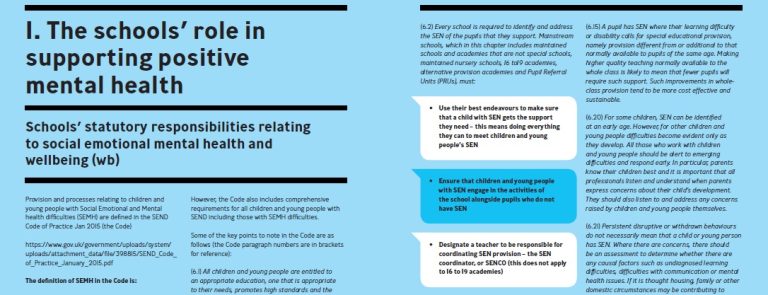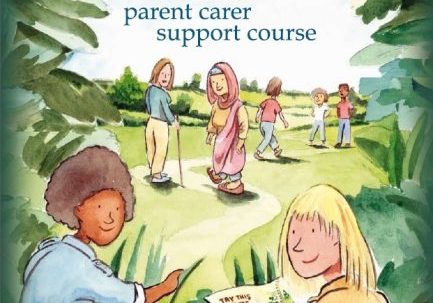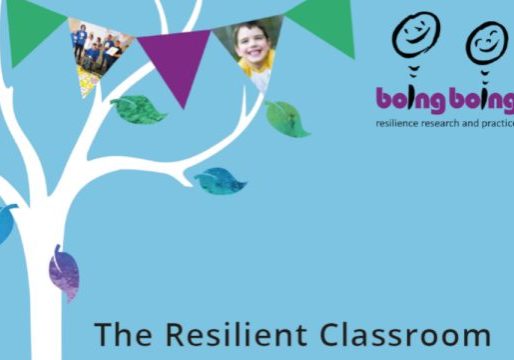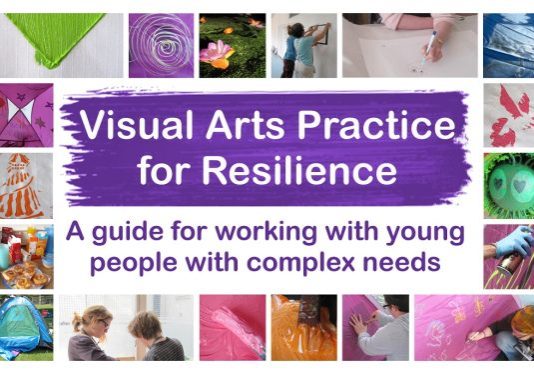Supporting children and young people in their mental health
A guide for East Sussex schools: a resilience-based, whole school approach to promoting positive mental health and addressing individual needs
Introduction
The purpose of this guide is to encourage and build on what good schools already do in terms of differentiation and adapting approaches to include all children and help to maximise their academic and emotional development. Good schools address barriers to academic outcomes, and this guide is designed to support schools in addressing emotional behavioural and emerging mental health problems which can be barriers to attainment. Taking a whole school approach to emotional and mental wellbeing and using some of the simple low cost suggestions for classroom teachers in this guide can support children and young people’s sense of belonging to a school and encourage attendance, good development and improve learning outcomes.
Section 1: Outlines the role of the school in supporting children and young people, what national guidance and Ofsted expect from schools in this area, and has been produced in line with local ESCC guidance for schools.
Section 2: Introduces the concept of resilience as a way of approaching positive mental health and the evidence based Resilience Framework. It also focuses in on what schools can do to promote resilience using a whole school approach, what ‘good’ looks like, and how this can be achieved.
Section 3: provides practical information on how teachers and school staff can support individual children and young people experiencing the most common mental health issues:
- Anxiety difficulties
- Depression
- Eating difficulties
- Self-harm
- Attention difficulties
- Conduct Disorder
- Post-Traumatic Stress Disorder
- Attachment difficulties
For each mental health issue there are some tips for simple and effective interactions with children and young people as well as some ideas for including parents. These tips are designed to be easy to use and can be printed out and pinned to classroom and staff room walls.
Section 3 also includes recommended further reading at the end of each part. The further reading has been chosen from websites and books that Boingboing have used to support our work and that have been highly recommended by parents and professionals.
Section 4: Focuses on the value of including children and young people in helping to create positive prevention activities, identifying gaps and creating solutions, and some suggests practical ways in which this can be achieved.
Section 5: Contains appendices that provide more detailed reading as well as a sample lesson plan.
The entire guidance document is available to download from the link at the bottom of this page.
Individual sections and guidance on the most common mental health issues are available to download at the bottom of each page. You can also download the full guide: Supporting children and young people in their mental health: A guide for East Sussex schools or read online below:
Supporting children and young people in their mental health: A guide for East Sussex schools
Schools’ statutory responsibilities relating to social emotional mental health and wellbeing
Provision and processes relating to children and young people with Social Emotional and Mentalhealth difficulties (SEMH) are defined in the SEND Code of Practice Jan 2015 (the Code). The Code includes comprehensive requirements for all children and young people with SEND including those with SEMH difficulties.
Full guidance on the schools’ role in supporting positive mental health
Next, Understanding resilience



